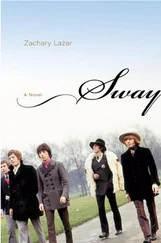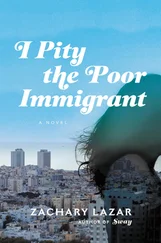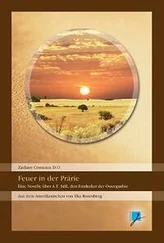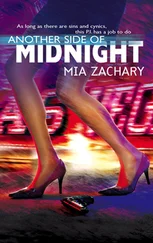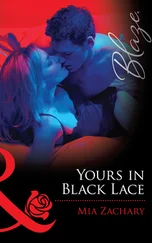At one point, Ken gets up. “Zack, I’ll make us something to eat. I cooked something here.” He opens the fridge, takes out some containers, turns on the microwave. I am tired to death from all the driving and loneliness and so exhausted that I don’t have the energy to tell him I’m not hungry. I slip down from the bar stool, go to the bathroom (decorated with a dusty plastic flower), urinate for a long time, flush the toilet once before I finish, and flush it once more while I’m zipping up my pants. I go back in the room and recline on the sofa for a while. I find a pillow and hug it.
I wake up to laughter. I wake up after the most beautiful experience I’ve had in a long, long time. A warm spring day. Stella and I are walking slowly, shoulder to shoulder, in the shadow of young, green, blossoming trees, on a road that climbs upward. Stella slows down from time to time to admire the acacias. Further up, we pass some apple trees with large pink and white blossoms. She pauses at one of them, reaches up, picks a handful of petals, and puts them in her mouth, squinting with pleasure as she chews them. Then, she opens her eyes, comes closer, puts her hands on my shoulders, and smiles. She looks me firmly in the eyes, and says: “Do you think we are finally free?”
My spontaneous answer is , “Of course,” but I don’t remember saying it. Then we both laugh. We laugh loudly. We laugh purely and deeply like innocent, innocent children. Her laughter wakes me up, but when I open my eyes, I hear only mine.
*
It was one of the few nights we spent together during that last year. We sat in the patio chairs, wrapped in blankets. We lit a candle, sipped wine, and gazed at the dark canyon before us. The frogs were croaking.
Suddenly, the phone rang in that particular way it does when someone from far away is calling. The neighbor’s cat was on my lap, so Stella picked up. She stood quietly for a long moment, then said, “But, of course. Thank you!” She replaced the receiver, topped off her glass, and asked me if I wanted more. “No,” I said. “I don’t.” She came back, sat in her chair, hugged her knees, narrowed her eyes, lifted her head up toward her favorite Orion, and started rocking back and forth. I swear I saw a tear roll down her cheek, but she quickly wiped it away with her shoulder. Or maybe I just imagined it. I watched her face for a while — lit by constellations, softened by the trembling candlelight. For the first time in a long time I felt the urge to get my camera and photograph her. I suppressed the impulse.
“I’ve been invited to the Berlin Biennale next year, in October.”
“What!?” I shouted. The frogs grew quiet. I lifted my glass to toast her but it was empty, there was nothing in the bottle either. Stella smiled, leaned over, and poured some of her wine in my glass. We toasted. We drank. Then she gently held my face with both her hands and kissed my lips. She kissed me like she never had before. Again. And again. She kissed me wetly and warmly, she kissed me long and deep, she kissed me as if one of us was dying.
The truth was that what remained of me in that patio chair was a papier-mâché mask, growing cold.
*
Pennsylvania. Lancaster County.
Autumn has settled in here long ago. Old woodlands sunk in misty clouds. Silence. The dark gray line of wet asphalt draws a stretched out S and disappears up ahead in the fog, which is growing thicker with every second. Atop a little knoll stands a bunch of tall, dark shrubs, like widows resting by the road. I pull over. I load a new roll of film in the camera, walk through the thick, wet grass, take a few pictures, then notice the wooden poles tied with barbed wire, open the aperture to focus only on what I need, and get closer. I let the wire come down from the top left corner of the frame and lead the eye toward the focus, which I choose to place down in the right third. The shutter clicks. I stride further into the moist meadow until I see the ruins of an abandoned barn. A bottomed-out roof, protruding beams and poles, shattered wooden planks, and rusty tin sheets are buried in weeds and obstinate shrubbery. And, as if the years of solitude and harsh climate were not enough, a wild walnut tree growing through the middle ruptures its insides spring after spring. How abandoned could an abandoned barn be! Couldn’t somebody simply tear it down?
My grandfather, Stefan Nichts’ shop looked somewhat like this the last time I saw it. Stefan Nichts was not my real grandfather. He was one of my grandmother’s brothers. He had been an artist and a master carriage-maker before World War Two — a quite wealthy man who had traveled and lived in Venice and Germany. Then, the communists came, appropriated everything he owned, and tossed him in a labor camp. After some years, he was released, went to the countryside, scraped some money together, and opened a shop in his village. Not for horse-drawn carriages, but for handmade donkey carts. He became a cartwright. I remember how people would come from all over to order and buy carts from him. I liked to hover around him in his dim workshop, handing him tools, listening to his stories (he had lots), fanning the fire with the bellows, and watching him work. I remember how, sometimes, in his dusty little windows, never touched by a woman’s hand and covered in thick cobwebs and mummified flies, a beam of sunlight would squeeze in, and countless tiny specks of dust would dance in it.
Grandpa Stefan Nichts would weld the carts in his shop and then drag their naked torsos out under the thick shadow of the walnut tree to dress them in warm, vibrant colors. I sometimes think that he got into crafting carts just so he had something to paint without his townsfolk taking him for a complete loon. Not that they took him for normal anyhow. When he was young, Grandpa Stefan had had an affair with a Greek woman who, malicious rumor has it, sucked his brains dry before leaving him. After her, he never married or had any children. Every day, he would drink bitter Turkish coffee that he boiled in a beat-up, ancient coffee pot, smoke filterless cigarettes, and cough. Every evening he’d go down to the pub, where he’d get drunk on menta (mint schnapps) and curse the communists. He would threaten to hang himself, wave his fist in the air, and yell, Nichts! Nichts! No! That’s why they called him Nichts. In my memory, he looks like the late Ezra Pound — messy haired and stubbly — in that 1971 Henri Cartier-Bresson portrait. Grandpa Stefan Nichts spent the last winter of his life sick, broken, and bedridden under the window in his lonely bachelor pad.
The last time I went to see him, I was a senior in high school. I hitchhiked from the city to the village. It was foggy and dreary. I rode in an old Soviet car, a tractor, and a truck and arrived in the village just before dark on a donkey cart. First, I peeked into his abandoned shop. It had been looted and torn apart. There were no windows, hinges or doors, half of the roof was missing. Wild walnut trees grew everywhere. I went out, crossed the weeded yard, climbed the run-down steps, and opened the door to his room. I swear I saw a fat rat clumsily jump down from his pillow, where somebody had left a piece of hard bread, and slide under the kitchen cupboard. Grandpa Nichts was trembling, freezing under the army blanket, soaked in his own urine, his head turned toward the ugly tapestry hanging by his bed. I had brought freshly ground coffee. I boiled it in his grotesque coffee pot. The scent of coffee chased the stench from the room for a moment. I managed to lift the old man’s pillow a bit, propping it up with two dusty wool coats. I found some cups, rinsed them with cold water, and took a few sips of coffee. He also wet his parched lips with the black liquid, but only to stain them a little. His once shiny and expressive eyes were now soaked in the foggy light of that departing winter day.
Читать дальше




